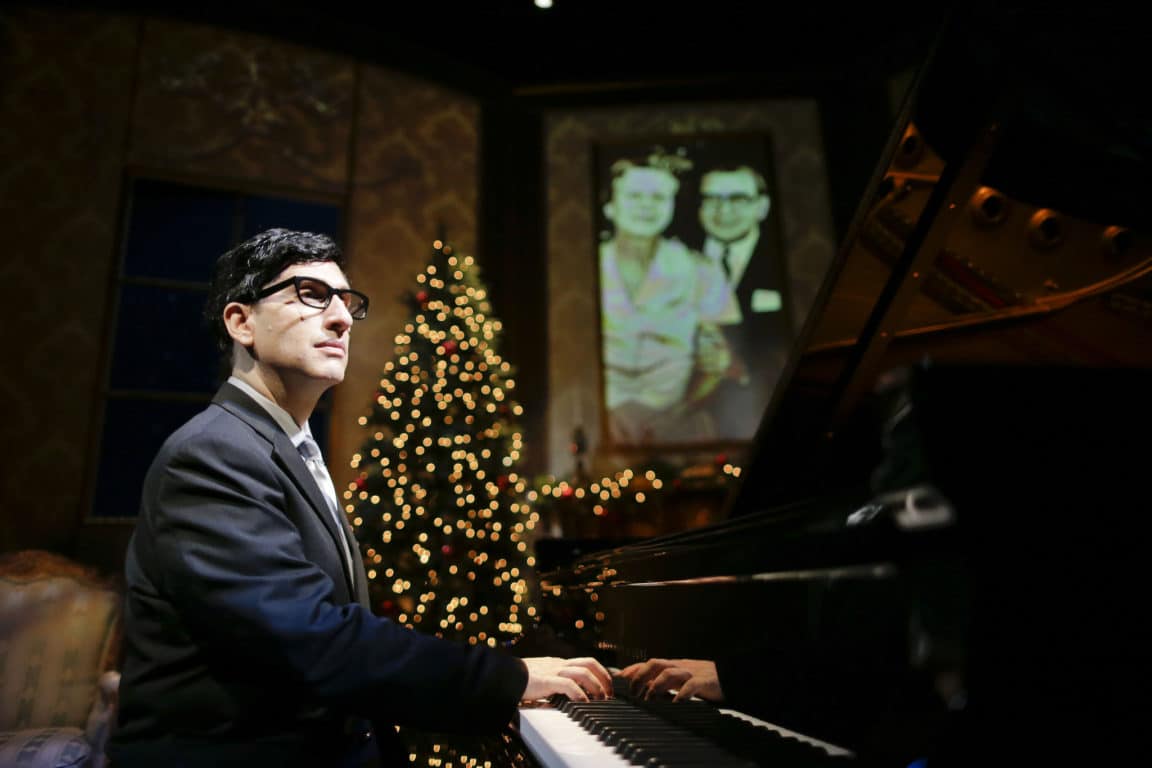If you’re feeling the holiday blues or post-election anxiety, or you’re depressed by a seemingly irreparable schism in the American population, you should come to Portland Center Stage to see and hear Hershey Felder as Irving Berlin. Come before the show closes on Friday. Or even if you’ve seen it already, come to the big Great American Songbook Singalong on New Year’s Eve. You will, once again, feel the warmth of community. You’ll see the son of Jewish immigrants call up the life of an iconic Jewish immigrant in song, piano music, and storytelling. At times you can sing along, softly or lustily, as have many audiences before you. And you may shed a few tears. But for sure, you’ll leave with a smile and a warm heart.
On the recent Winter Solstice I had a warm conversation in a chilly Green Room with Felder, with occasional input from his director, Trevor Hay, and enthusiastic listening from PCS’s Claudie Jean Fisher. We touched on everything from the rigorous schedule of daily performances, to music and humanity, to the current state of nation.
Hershey Felder presents a one-man show in which he sings, plays the piano, tells stories, and plays various characters — and this happens every single day except Mondays, sometimes twice a day. I consider this schedule to be exhausting. “Of course it’s exhausting,” he replied, “but that doesn’t figure in as part of the equation. It’s my job. It requires a lot of training and thinking and maintenance of all sorts. You have to eat the right food and get enough sleep. The audience comes and they pay, and one just has to recognize how lucky one is, so there’s no place to kvetch about being tired. I have to be 110 percent fresh for the audience.”
When I ask him in what sense he feels lucky, he replies, “There are a lot of people who are struggling to make careers in any aspect of the arts. And I get to do all kinds of things at once” [quite an understatement], “but it’s not just luck. You have to work hard to be lucky.”
As the precocious child of Jewish immigrant parents, Felder grew up speaking several languages: Hebrew, Yiddish, French, English, and a little Hungarian from his mother’s side of the family. When I asked him about the effect of his heritage, he quipped that he never learned to speak English properly! “There were a lot of holes in my education, but I am quite well-versed in my chosen profession.” He quotes his old friend Theodore Bikel: “Everybody says to me, ‘You do everything so well!’ And I say, ‘No, it’s just that what I don’t do well I don’t do.’” One of the legacies of his parents is his sensitivity about what it means to be an immigrant. He observes that immigrants often want to give something to their new country. “Not everybody is just there to take. Some people want to be able to come and to give as well.” He wants to remind the people who are “spewing all of this horrid rhetoric about immigration” that we are a country of immigrants.
Felder has a younger sister, a storyteller “in writing” whereas he is the storyteller “in mouth.” While he always had an audience of family members for his stories, his sister wasn’t looking for an audience. “She’s not as showy as I am, but she’s a lovely, lovely person.” When I ask if he was always comfortable as the center of attention, he replies, “I’m never comfortable as the center of attention. I’m only comfortable in the context of doing something that gives the audience joy, tears, feeling good, or whatever it is. If you notice, I don’t stay long on the stage for bows, and I don’t do autographs. That sort of thing makes me uncomfortable.”
Irving Berlin is by no means the first of Felder’s programs on composers. He has created musical dramas about Beethoven, Chopin, Liszt, Gershwin, and now Tchaikovsky. The unique contribution of these performances is in pairing the stories of the composers’ lives with their music. The result is that the audience has a much greater understanding of the music. “From the very beginning, that was my goal with all of these characters — to give them a context. The music wasn’t just born in mid-air. There were circumstances out of which these things were born.”
It is clear that Felder prefers classical composers, but he sometimes chooses his subjects for practical reasons. “Some of them select me,” he says. “In this case [Irving Berlin], it was because somebody wanted it done. Gershwin was because I was told that nobody will come unless you do something popular – I wanted to do Chopin.” And, of course, he also did Chopin. For quite a while he has wanted to do a Russian composer. “I have a lot of Russian blood in me,” he says. “I thought there was a good Russian story somewhere, just didn’t know where. Then we found one and it turns out to be perfectly timed. Who knew that the whole world would go according to the fact that we chose Tchaikovsky? Funny thing.”
The Tchaikovsky show will be performed for five weeks at San Diego Repertory Theater in January, after which it will be in Laguna for five weeks. When I am eager to know if he is coming to Portland with Tchaikovsky, he tells me, “They’ve started to pester me, so we’ll see. But right now it’s freezing here! Who comes to Portland in the winter?” Claudie speaks up to recommend May, and there is discussion about October. So it’s still uncertain, but Felder is adamant about no more winter.
I ask whether Felder choses these particular composers because they’re all so passionate, as opposed to someone more mild, like Mozart. Felder almost levitates when he corrects me. “Mozart is full of passion!” he retorts. I apologize and he continues. “They’re all passionate in various degrees and ways. I don’t know how you can be a composer or artist without being passionate. First of all you can’t get good enough without being passionate. It’s about commitment, and I think every single one of these people was committed in the extreme. Passion is not always overt, where you squeeze the rag and all the schmaltz comes out.” It obviously takes a lot of hard work.
In a Russian accent, he then tells a favorite quote from his play where Tchaikovsky addresses people in Cambridge, England: “The local newspapers say this of me: That I am a kind and gentle man. But in my music, I unleash such a hurricane with as little pity on my listeners and on my interpreters as Satan has for the damned.”
In addition to Tchaikovsky’s music, Felder’s play touches on the subject of the composer’s homosexuality. “Tchaikovsky had a terrible problem. The essence of the play deals with the underlying current in the anti-gay propaganda laws in Russia, which would have had Tchaikovsky in jail [if it were now]. And yet, he is their national hero. It’s a very complicated thing for them to deal with. Their culture minister has said unequivocally that Tchaikovsky was not a homosexual — that there is no evidence of him being a homosexual. What? So how do you tell his true story? The whole thing is total propaganda.”
One of the plays created by Felder in which he does not perform is called The Pianist of Willesden Lane. It is the story of Lisa Jura, a Viennese Jewish girl saved from the Nazis by the Kindertransport to London during World War II. Lisa Jura became a well-known concert pianist, thanks to her own passion, resilience, and commitment to her music. In this play, the well-known concert pianist is Mona Golabek, daughter of Lisa Jura. The show played to sold-out houses at Portland Center Stage for two weeks last June and will be coming back this coming June 17-30, 2017.
Having read Mona Golabek’s inspiring book, The Children of Willesden Lane, I am interested to find out about her connection to Felder. This time Trevor Hay answers my questions: “Mona selected Hershey. She hounded him and persisted for years. She kept saying, ‘I have this book that’s my mother’s story,’ and she gave him the book. She had very clear opinions about what she wanted, but he said, ‘If we’re going to do it, we’re going to do it my way.’ Mona kept pestering him and finally she said ‘Alright, we’ll do it your way.’ ” Evidently it took more than five years but Felder adapted the book and blended the music, and at the end they agreed on the outcome. Because Golabek is not a trained actor, Trevor Hay worked with her to tell her story in a natural and convincing way. “She’s an incredible pianist, and she tells her story so simply that something resonates with her — it’s like she’s everywoman, everyperson. And it works.”
I had also done a little reading about Felder’s famous wife, Kim Campbell, former prime minister of Canada, who is on all kinds of national and international committees and boards to promote peace and democracy. When I remark that she’s an amazing lady, Felder agrees and says, “Unfortunately, she wakes up very unhappy nowadays. She’s in total despair. When I’m in despair it’s one thing. But she actually knows about all of this stuff! The latest thing she said is that she’s going to start a blog on how to deal with what’s going on — personally, ethically, morally, and emotionally. And I’ve really encouraged it.”
We agree that there seems to be a collective trauma generated by the recent campaign and election. “The earth has been removed from under everybody’s feet,” he states. “It’s not an imaginary thing. People are getting sick. When lies are the essence of things, you can’t fight them.” He blames social media for some of it. “With the Internet and Twitter the information is transmitted so fast that it can undo anything, not in days or months, but in seconds. It’s like we have not one but millions of little Goebbels. Twitter is basically Goebbels-feed — lies tweeted enough become truth. The question is what do you do?”
We sit for a moment in silence.
Then Felder offers a solution. “What’s interesting is what’s going to happen to bring this country together. I think what we need is an alien invasion. That’s the only thing — a UFO invasion could actually do it!”
Everybody laughs.
I point out that Felder goes on stage every day, portraying authentic lives. Through his creativity he promotes truth with every performance, and thus he is giving people that gift. After experiencing Irving Berlin, I had felt as though a cloud had lifted from my life.
He responds: “I don’t know that I’m promoting truth, but I’m promoting the notion that we are all worth something. I would like to think that I bring people together and remind us all of our stories. We need to keep telling them so we don’t forget our humanity. You know, humanity used to be such a cheesy term. If somebody said that to me ten years ago, I would say ‘Ach, never mind your humanity.’ But now it’s so important to remember who we are as people and that we need to be kind to one another. There is value in doing something that makes the world a better place, not tearing it apart, even if it’s just getting an audience to sing. There’s value in all of this.”
I ask Felder about the connection between humanity and music. He directs the question to Hay, who responds with eloquence: “I think music is healing, especially what Hershey is involved in. When he plays Beethoven or Chopin you realize that beauty exists. It’s about making choices to promote beauty and to live beauty. Beauty was always there. It was there in the Holocaust, in Vietnam, and in the French Revolution. And music has always been there. It’s about humans tapping into that. I think what Hershey does is remind us of what’s always there. It’s easy to get caught up, especially since we’ve never lived in an age like this before, with this kind of media. I won’t go on to Twitter. I find it disturbing. I know there is value in social media but it’s so constant, such a barrage. This whole campaign we just saw, all the fake news, everything is haywire. I think we’ll have to figure out this Brave New World and figure out how to live.”
Hay continues, “I think it helps, it’s very human, very grounding to experience Hershey in this one-man show, where he plays beautifully, tells a beautiful story, and everybody in the room is connected. Also, when they sing there is that desire for connection, and then we can’t even stop them. Once they sing the first song, that’s it. ‘Oh, we get to sing!’ On New Year’s Eve we’re doing a songbook singalong. It’s fantastic. Everybody sings all night. It’s a room full of like-minded people, very bipartisan, very healing. All the BS goes away. It’s a great party and people leave with big smiles.”
This is Hershey Felder’s gift to us – stories and music to remind us of our shared humanity.




